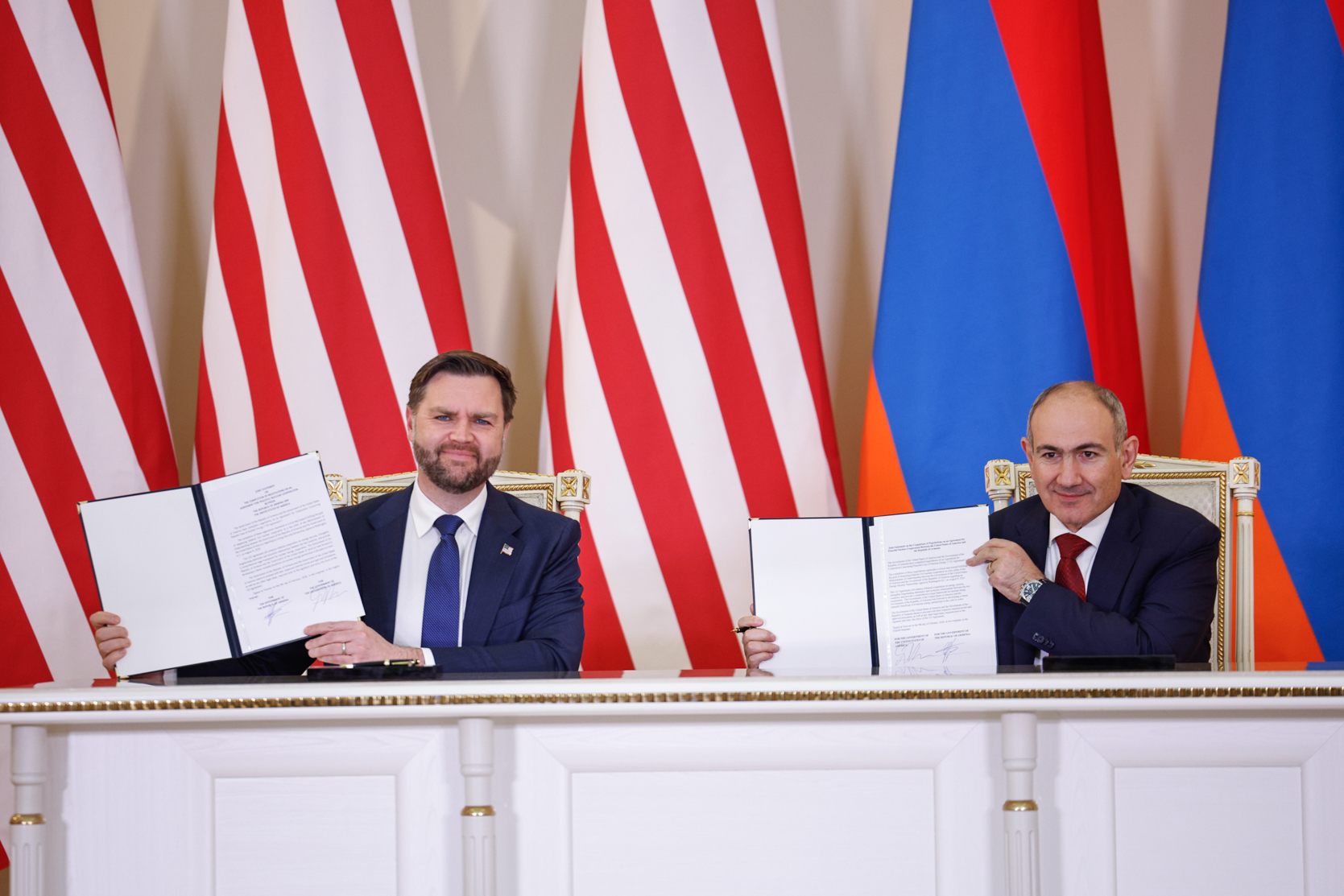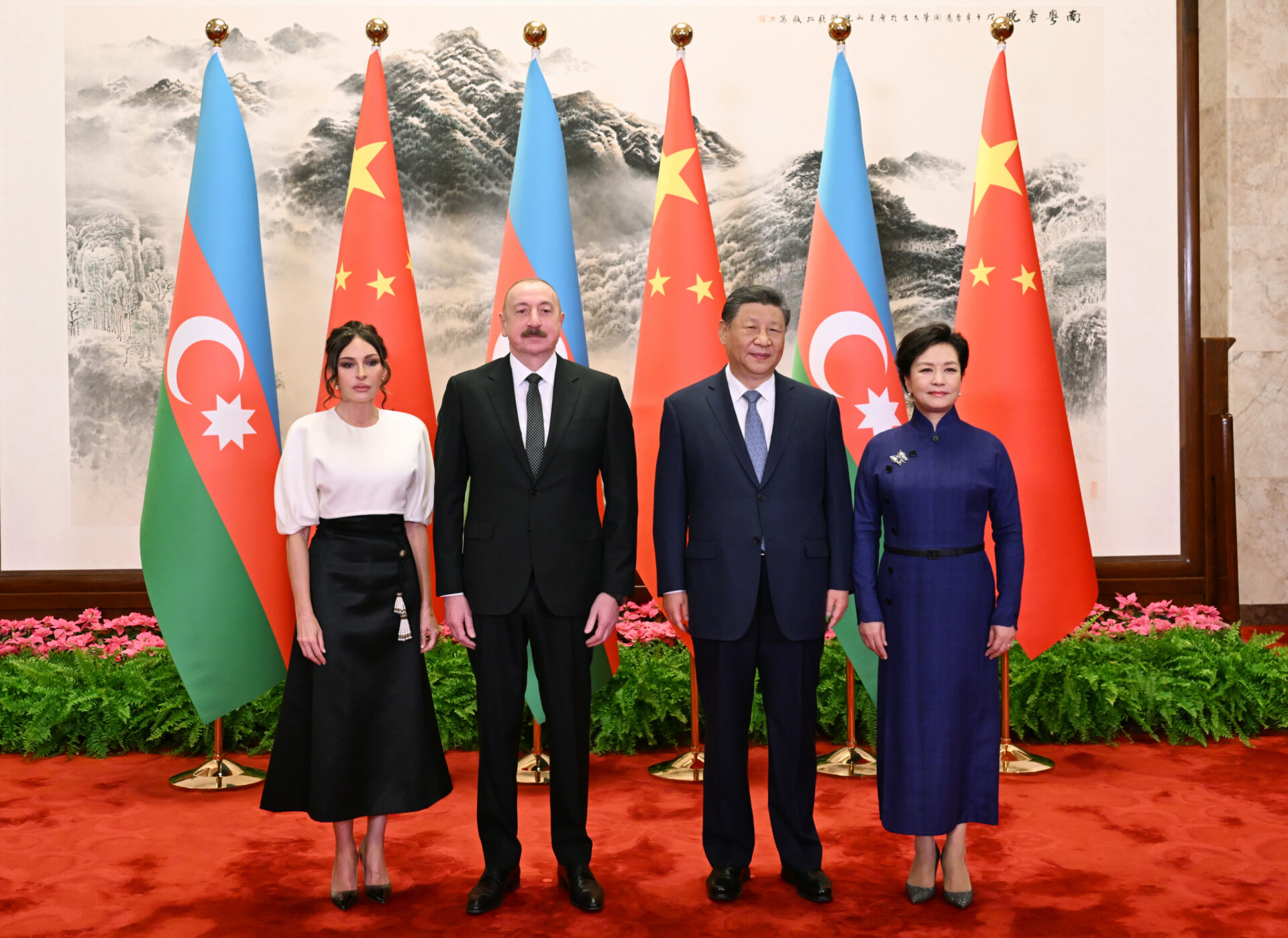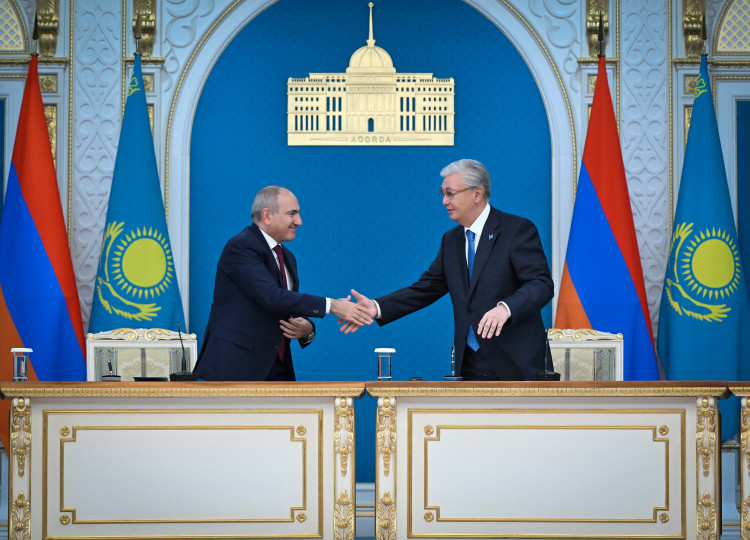
Consequences for Georgia After the Peace Declaration Between Azerbaijan and Armenia
Consequences for Georgia After the Peace Declaration Between Azerbaijan and Armenia
Executive Summary:
- The recent peace declaration between Armenia and Azerbaijan on August 8—mediated by the United States—has stirred great interest in Georgia, as it signals an increased Western presence in the South Caucasus.
- The ruling Georgian Dream party has sought to convince the West that, despite its authoritarian policies and stronger ties with Russia and the People’s Republic of China, the West must nevertheless accept Georgia as it is; otherwise, Georgia will fully turn East.
- Renewed Western influence in the South Caucasus means Georgian Dream’s ability to engage in “geopolitical bargaining” with the West vis-à-vis the East is weakening, while the West is acquiring more tools to exert pressure on the Georgian Dream.
On August 8, the peace declaration between Armenia and Azerbaijan, signed in Washington with the mediation of U.S. President Donald Trump, stirred great interest in Georgia (The White House, August 8; see EDM, August 12). The Georgian opposition assessed this as a collapse of the ruling Georgian Dream party’s foreign policy, which is characterized by its pro-Russian stance. For Georgian Dream, the United States’s role as mediator for the peace treaty undermines its anti-Western propaganda, which has been built on the claim that the West wants to unleash a new war in the South Caucasus. Georgia’s imprisoned former president, Mikheil Saakashvili, described Trump’s meeting with the leaders of the two South Caucasus states as a “grave geopolitical catastrophe for Georgia.” Saakashvili claims that the agreement signed in Washington between Azerbaijan and Armenia, which opens a new transit corridor bypassing Russia, Iran, and Georgia, renders Georgia an isolated country, alongside Russia and Iran. (Facebook/SaakashviliMikheil, August 8). Georgian Prime Minister Irakli Kobakhidze publicly congratulated the presidents of the United States and Azerbaijan, as well as the Armenian prime minister, on “reaching a historic peace agreement and the beginning of a new era of stability and economic development in the region” (Ekho Kavkaza, August 12).
The day before the Washington summit on August 7, notably marked the 17th anniversary of Russia’s military aggression against Georgia. Commemorating the day, Kobakhidze stated that in 2008 “the Saakashvili regime started the war on orders from outside, on orders from a deep state,” hinting again at the United States and the West (Interpressnews, August 7). The term “deep state” is used by the Georgian Dream to denote a mythical global power, referring to Western countries (see EDM, January 13). The United States’s mediation the next day, however, demonstrated that, on the contrary, the West is actively seeking to establish peace in the region and is committed to stable economic development.
On September 1, the press service of Georgian President Mikheil Kavelashvili, whose legitimacy is not recognized by the opposition and part of society, released an open letter that Kavelashvili sent to Trump. Before this, Kobakhidze had already addressed Trump twice with similar open letters (see EDM, June 2). The letter highlights the complete collapse of Georgian Dream’s foreign policy, as Kavelashvili expresses regret that the Trump administration “does not give due attention to Georgia.” Instead of the U.S. administration, the “deep state” is again actively involved in Georgia, trying to destabilize the country and disrupt peace. At the same time, addressing Trump, Kavelashvili also reproaches him for the fact that in the few months of his presidency, Trump has established close relations with all of Georgia’s neighboring countries, successfully facilitated the signing of a peace agreement between Azerbaijan and Armenia, actively cooperated with the Turkish authorities, and even restored partnership with Russian President Vladimir Putin, but has said nothing about Georgia (Facebook/MikheilKavelashviliOfficial, September 1).
Over the past 30 years, Georgia has been the only country in the South Caucasus to act as a stable partner to the West. Armenia has primarily served as an ally of Russia, while Azerbaijan has sought to balance between the two. These recent events, however, demonstrate how geopolitical alignment is undergoing significant changes in the region; Armenia and Azerbaijan have rapidly begun to shift toward the West, while Georgia is moving away from the West and closer to Russia and the People’s Republic of China (PRC) (see EDM, October 24, 2024, March 12, 31). On August 8, Deputy Foreign Minister of Russia Mikhail Galuzin said, “We remain in the position of readiness to develop healthy pragmatic cooperation with Georgia, where it is beneficial to both parties, and are ready to follow the path of bilateral normalization with Tbilisi. So, in general, the matter is for Tbilisi to decide on its further actions” (Izvestiya, August 8). Additionally, on August 12, the Russian Interests Section at the Swiss Embassy in Georgia issued an announcement in Russian and Georgian stating that the Russian Gorchakov Foundation for Public Diplomacy was inviting Georgian youth to a free internship in Russia. The Russian Foreign Ministry established this foundation, which also maintains close ties with Russian intelligence services and is involved in disseminating Russian soft power abroad, particularly in the so-called “near abroad.” In 2018, the foundation planned to hold a “Young Leaders Forum” in Tbilisi, organized by the Union of Russian Youth of Georgia, but it was canceled. The organizers then stated that the reason was “unmotivated aggression on the part of individuals and the media” (Apsny.ge, August 12). For Russia, the recruitment of Georgian youth remains one of its top priorities.
The Washington meeting suggested that Georgia could lose its geopolitical significance for the United States, which has historically been based, among other things, on Georgia’s monopoly transit capabilities. Former White House official Michael Carpenter believes that Georgia’s close ties to Iran, Russia, and the PRC are making the country less important in the region for Western partners. Carpenter believes that the new Trump Route for International Peace and Prosperity (TRIPP) will allow international companies to diversify the transit routes they use for trade, and Georgia will no longer be the only or best choice (Independence Avenue Media, August 13). [1]
Georgian transport corridor expert Paata Tsagareishvili, the head of the Transport Corridor Research Center, suggests that the Zangezur Corridor—which would connect Azerbaijan and Türkiye through Armenian territory—is unlikely to become operational for at least five to seven years. In the meantime, he argues that Georgia should implement several key infrastructure projects to enhance its competitiveness as a hub for the Middle Corridor (Batumelebi, August 14). Notably, Georgia has yet to complete the construction of the new East-West Highway, which began in 2007 and connects eastern and western Georgia. The total length of this highway is 430 kilometers (around 267 miles), and only 70 percent of it has been built (Batumelebi, August 14). As reported in local Georgian media, the completion date of the construction has been postponed six times. According to the latest statements by representatives of the Georgian government, the construction of the highway is expected to be completed by 2032, which means that by that time, the competitor transit routes through Armenia may already be operational (Business Press News BPN, August 8). In an effort to ease the wave of criticism on this matter, one of the next highway sections was opened only a week after the Washington summit on August 15. In his address at the road inauguration ceremony, Kobakhidze stated:
The inauguration of the Surami Bypass Road—a crucial section of Georgia’s main transportation artery, the East-West Highway—is a landmark event for our country. This project represents another step toward our strategic goal of making Georgia the central, fastest, and safest link of the Middle Corridor connecting Europe and Asia (Government of Georgia, August 15).
Additionally, the Georgian government has yet to fully utilize the 827-kilometer (around 514-mile) Baku-Tbilisi-Kars railway section, which is intended to connect Azerbaijan and Türkiye via Georgian territory. The construction of this railway section was started under the previous Georgian government in 2007 and was ceremonially opened in 2017 (Ministry of Infrastructure of Georgia, October 30, 2017). Despite the official opening, this railway section has yet to operate at full capacity. Georgian experts warn that, in addition to the Zangezur corridor, other transit routes through Armenia’s territory can be used earlier than the route (YouTube/TV Pirveli, August 10). In this case, Georgian roads, railways, and Black Sea ports, including in Poti and Batumi, may experience significant losses in cargo flows. At the same time, if Georgia’s foreign policy remains oriented toward Russia or the PRC, transit routes through its territory will become unattractive to Western investors.
If new transit routes bypassing Georgia were to emerge, the Baku-Tbilisi-Ceyhan (BTC) oil pipeline and the South Caucasus Pipeline—also known as the Baku-Tbilisi-Erzurum pipeline, which currently transports Azerbaijani oil and gas to world markets via Georgia—would likely not face significant competition. It is unlikely, due to economic and logistical reasons, that investors would support the development of new pipelines bypassing Georgia.
The main strategy of Georgian Dream’s foreign policy over the past few years has been built on the geopolitical blackmail of Western countries. Georgian Dream—despite building an authoritarian country—strives to convince the West that it must nevertheless accept Georgia as it is; otherwise, the East is ready to embrace Georgia (see EDM, June 2, 10, 18, July 14). On August 14, a few days after Trump met with leaders from the South Caucasus, the Georgian Ministry of Economy issued a press release stating that the Chinese energy company Zhongbo Group is considering investing in Georgia. Georgian Economy Minister Mariam Kvrivishvili, during a meeting with the Chinese company, discussed the investment climate in Georgia’s energy sector, its development strategy, reforms, and key projects (1tv.ge, August 14). U.S. Representative Joe Wilson, a vocal critic of the Georgian Dream, immediately responded to this news. He wrote on his official Х account, “China [is] trying to lock the USA out of the Middle Corridor. Armenia-Azerbaijan peace is a huge step, but South Caucasus peace and prosperity is in danger if China dominates Georgia!” (X/RepJoeWilson, August 14).
In August, the U.S. State Department published its first critical report under the Trump administration about human rights in Georgia for 2024. It states that throughout the year, reports of physical attacks, intimidation and threats of violence, coercion and persecution of citizens, journalists and others persisted (U.S. Department of State, August 12). This report demonstrates that Washington has already taken a negative stance toward Georgian Dream. The Georgian government likely hoped that the Trump administration would not take an interest in Georgia and the Caucasus, and therefore, the United States would overlook Georgia’s rising authoritarianism and deepening ties with Russia and the PRC (see EDM, April 9). With the U.S. mediation and the signing of the peace declarations between Armenia and Azerbaijan, however, the United States has sought to establish renewed influence in the region, while Russia’s presence has notably declined (see EDM, July 7). Renewed Western influence means Georgian Dream’s ability to engage in “geopolitical bargaining” with the West vis-à-vis the East is weakening, while the West is simultaneously acquiring more tools to exert pressure on the Georgian Dream.
[1] Michael Carpenter is a board member at The Jamestown Foundation.


